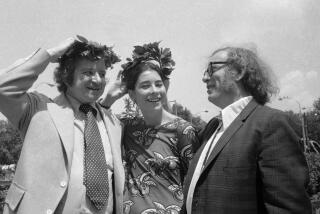Malcolm Muggeridge; Social Critic
- Share via
Malcolm Muggeridge, Britain’s impish essayist and caustic critic, died Wednesday in a nursing home in Sussex.
Vernor Miles, an attorney for the family, said the legendary journalist and broadcaster--a wastrel, socialist and atheist in his youth but an aesthete, traditionalist and Roman Catholic at his death--was 87.
Muggeridge had suffered a stroke several months ago and was admitted to the nursing home in southern England.
Already renowned as a journalist who had written from the Soviet Union, Egypt, India and the United States, Muggeridge attracted a new generation of Britons with his literate vitriol in the 1950s when he became a TV commentator.
His comments were such that the British Broadcasting Corp. banned him in 1957 for his comments on the origins of British snobbery, which many viewed as a personal attack on royalty.
Television itself, he later wrote in the anthology “Muggeridge Through the Microphone,” was a destructive force “far more than even nuclear weapons.” He called it “the great falsifier” for having replaced the spoken and written word.
But he then chastised newspapers for resorting to “bingo and nudes” in an effort to retrieve readers lost to television.
By this time his merciless criticism of what he viewed as Britain’s permissive society had earned him the sobriquet “St. Mugg.”
He enjoyed journalism, he said, for it gave him an opportunity “for contact with the eminent without being under the necessity to admire them or take them seriously.”
He thought Winston Churchill a “disaster,” John F. Kennedy a “fraud,” and said Ronald Reagan was “not such a fool as people say.”
Unlike many commentators of the day, Muggeridge never espoused a particular political philosophy or cause but instead defended tradition while attacking modern political pundits.
Critics found him stuffily arrogant in his opposition to contraception, abortion, divorce and pornography and hypocritical for lashing out at the smoking, drinking and adultery that he had enjoyed as a younger man.
But Muggeridge also had a lighter side, particularly visible from 1953 to 1957 when he was editor of Punch, the humor weekly.
“Life, as I discovered, holds no more wretched occupation than trying to make the English laugh,” he summed up.
As a young man he had praised the Soviet experiment in communism until he went there in 1932 as correspondent for the Manchester Guardian and left as one of Joseph Stalin’s severest critics.
He abhorred war but served as a spy during World War II, earning such awards as the French Legion of Honor and Croix de Guerre.
While working in intelligence he became friendly with Graham Greene and the double agent Kim Philby.
In the second of his three autobiographies, “The Infernal Grove,” he recalled those years, concluding that “diplomats and intelligence agents, in my experience, are even bigger liars than journalists.”
Although a modern man who seemed content to be alive in his own time, there was something of Victorian earnestness and moral urgency about Muggeridge, who was capable of pixieish humor one day and deep depression the next.
He saw Western civilization as doomed, the inevitability of death as the most interesting aspect of life, and life itself as an adventure, mystery and a disappointment “for anyone of any sensitivity.”
“Human life, I have come to feel, in all its public or collective manifestations is only theater, and mostly cheap melodrama at that,” he concluded.
“There is nothing serious under the sun except love; of fellow mortals and of God.”
God came to be an ever-increasing presence in Muggeridge’s last years, particularly after age 80 when he converted to Roman Catholicism. In 1988 he wrote “A Spiritual Journey,” in which he discussed his lustful youth and subsequent progression toward faith and redemption.
He was born in London, one of five sons of a Fabian socialist and Labor Party member of Parliament. He was attracted to writing while a student at Selwyn College, Cambridge, and after his initial tour in Moscow for the Guardian, began to write books and plays.
His early work, “Winter in Moscow,” was about his disenchantment with socialism and was followed by a biography of Samuel Butler, called “The Earnest Atheist.”
He wrote of history in “The Sun Never Sets: The Story of England in the Nineteen Thirties;” of humor in “Tread Softly, for You Tread on My Jokes,” and of Christianity in “Jesus Rediscovered,” where he saw Christ as a living force but not a resurrected one.
Married in 1927 to fellow socialist Katherine Dobbs, he is survived by her and three children.
His later years were spent at his small cottage in Suffolk, where he walked, consumed vegetarian meals, gathered eggs and listened to records.
He never owned a television set.
“It only encourages fantasy,” he said.
More to Read
Sign up for Essential California
The most important California stories and recommendations in your inbox every morning.
You may occasionally receive promotional content from the Los Angeles Times.













